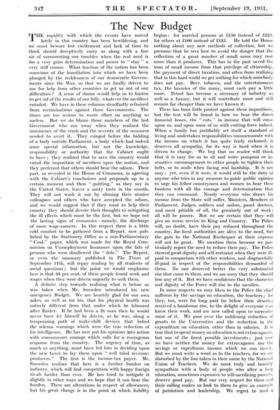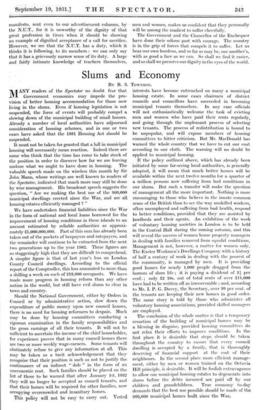The New Budget
rilHE rapidity with which the events have moved 1 lately in this country has been bewildering, and we must beware lest excitement and lack of time to think should deceptively carry us along with a fine air of surmounting our troubles when the real need is for a very grim determination and power to " stay " a very stiff course. What fraction of the nation has been conscious of the humiliation into which we have been plunged by the recklessness of our democratic Govern- ments since the War, so that we are finally driven to sue for help from other countries to get us out of our difficulties ? A sense of shame would help us to hasten to get rid of the results of our folly, whatever the sacrifices entailed. We have in these columns steadfastly refrained from recriminations against those Governments. The times are too serious to waste effort on anything so useless. But we do blame those members of the last Government who ran away when they realized the imminence of the crash and the severity of the measures needed to avert it. They cringed before the bidding of a body outside Parliament, a body which had indeed some special information, but not the knowledge, responsibility or authority that the Cabinet ought to have ; they realized that to save the country would entail the imposition of sacrifices upon the nation, and they preferred that others should bear the odium. Their part, as revealed in the House of Commons, in agreeing with the Cabinet's conclusions and proposals up to a certain moment and then " quitting," as they say in the United States, leaves a nasty taste in the mouth. They will not wash it out by abusing their stouter colleagues and others who have accepted the odium, and we would suggest that if they want to help their country they should devote their thoughts to mitigating the ill effects which must be the first, but we hope not the lasting signs of economies—namely, the discharge of more wage-earners. In this respect there is a little cold comfort to be gathered from a Report, now pub- lished by the Stationery Office as a non-Parliamentary " Cmd." paper, which was made for the Royal Com- mission on Unemployment Insurance upon the fate of persons who were disallowed the " dole." The Report, or even the summary published in The Times of September 11th, will repay reading by all students of social questions ; but the point we would emphasize here is that 33 per cent. of these people found work and wages when they were driven urgently to seek them.
A definite step towards realizing what is before us was taken when Mr. Snowden introduced his new emergency Budget. We are heartily glad for our own sakes, as well as for his, that his physical health was entirely different from that under which he laboured after Easter. If he had been a fit man then he would never have let himself be driven, as he was, along a temporizing path of make-shift devices that belied the solemn warnings which were the true reflection of his intelligence. He has now put his opinions into action with consummate courage which calls for a courageous response from the country. The urgency of time, as much as anything, must have led him in deciding upon the new taxes to lay them upon " well tried revenue- producers." The first is the income-tax payer. Mr. Snowden realizes that here is a further burden on industry, which will find competition with happy foreign rivals harder than ever. He has tried to mitigate it slightly in other ways and we hope that it can bear the burden. There are alterations in respect of allowances, but his great change is in the point at which liability begins : for married persons at £150 instead of £225, for others at £100 instead of £135. He told the House nothing about any new methods of collection, but we presume that he sees how to avoid the danger that the collection of a great number of small sums may cost more than it produces. This has in the past saved the man of small income from that privilege of citizenship, the payment of direct taxation, and often from realizing that in this hard world we get nothing for which somebody does not pay. Beer, tobacco, and the entertainment tax, the luxuries of the many, must each pay a little more. Petrol has become a necessary of industry as well as a luxury, but it contribute more and still remain far cheaper than we have known it.
There has been little protest against these impositions, but the test will be found in how we bear the direct financial losses, the " cuts " in income that will come upon us, and upon some of us with cutting force indeed. When a family has justifiably set itself a standard of living and undertaken responsibilities commensurate with the income on which it has quite fairly reckoned, it deserves all sympathy, for its way is hard when it is driven to change. We beg that no reader. will think that it is easy for us to sit and write pompous or in- sensitive encouragement to other people to tighten their belts, or to smile when facing real hardship. It is not easy : yet, even if it were, it would still be the duty of anyone who tries in any measure to guide public opinion to urge his fellow countrymen and women to bear their burdens with all the courage and determination that they can command. Nearly everyone who draws his income from the State will suffer, Ministers, Members of Parliament, Judges, soldiers and sailors, panel doctors, and most pitiable of all, the genuinely out of work : all will be poorer. But we are certain that they will give no worse service to King and Country. The Police will, no doubt, have their pay reduced throughout the country, for local authorities are alive to the need, but the gain to the National Exchequer at their expense will not be great. We mention them because we par- ticularly regret the need to reduce their pay. The Police showed great dignity and self-restraint when they were ill- paid in comparison with other workers, and disgracefully ill-paid in respect of the responsibilities demanded of them. No one deserved better the very substantial rise that came to them, and we are sorry that they should lose any of it. But we have confidence that the character and dignity of the Force will rise to the sacrifice.
In some respects we may liken to the Police the chief sufferers by the savings on education, the teachers ; for they, too, were for long paid far below their deserts ; received a handsome rise, to the delight of everyone v.ao knew their work, and are now called upon- to surrender some of it. We pass over the saddening reduction of grants to the Universities and the reduction in the expenditure on education, other than in salaries. It is true that to spend money on education is not extravagance, but one of the finest possible investments ; just now we have neither the money for extravagance nor the savings or superfluous income which we can invest. But we must write a word as to the teachers, for we are disturbed by the line taken in their name by the National Union of Teachers. We do most truly and heartily sympathize with a body of people who after a long education, sometimes expensive to self-sacrificing parents, deserve good pay. But our very respect for them and their calling makes us look to them to give an example of patriotism and leadership. We regret to read a manifesto, sent even to our advertisement columns, by the N.U.T., for it is unworthy of the dignity of that great profession in times when it should be showing an example of dignified acceptance of a call for sacrifice. However, we see that the N.U.T. has a duty, which it thinks it is following, to its members : we can only say that it has a grievously narrow sense of its duty. A large and fairly intimate knowledge of teachers themselves, men and women, makes us confident that they personally will be among the readiest to suffer cheerfully.
The Government and the Chancellor of the Exchequer have done their odious part with courage. The country is in the grip of forces that compels it to suffer. Let us bear our own burdens, and so far as may be, one another's, with as good a face as we can. So shall we find it easier, and so shall we preserve our dignity in the eyes of the world.



































 Previous page
Previous page